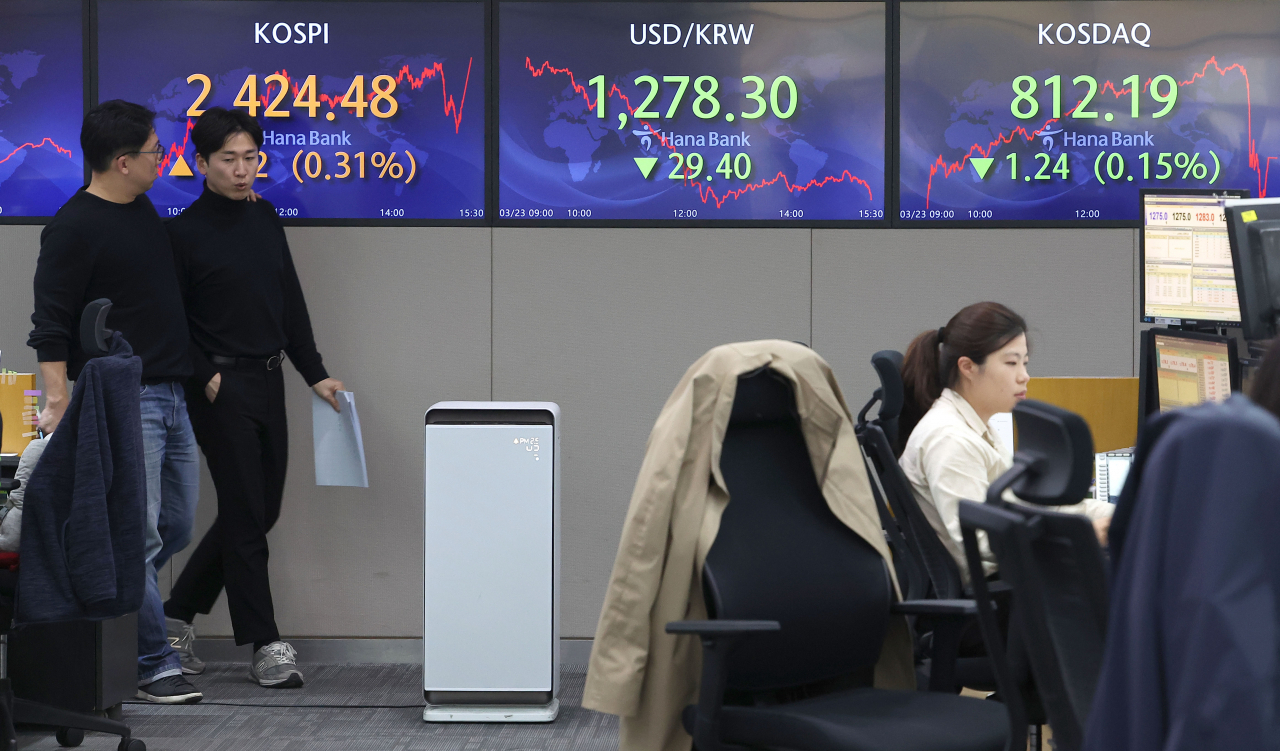US Fed’s quarter-point rate rise eases pressure on South Korea
Market maintains expectation that Korea's central bank will freeze rate in April
By Im Eun-byelPublished : March 23, 2023 - 16:11

The US Federal Reserve lifted its base rate by 25 basis points on Thursday, easing pressure for the Bank of Korea, which had been concerned about key rate differences between the two countries.
The Federal Open Market Committee went for a quarter-point move, raising the target interest rate from 4.5-4.75 percent to 4.75-5 percent.
The quarter-point raise fell in line with the market expectation which projected the Fed will not go for a 50 basis point hike following the recent turmoil in the banking industry.
Fed Chair Jerome Powell, however, stressed that “rate cuts are not in (the Fed’s) base case" in a press conference following the rate-setting meeting, warning the market that its aggressive monetary tightening stance to tame inflation is not over yet.
“At the end of the day, we will do enough to bring down inflation,” Powell said. “No one should doubt that.”
Though the Fed warned the slowed pace of rate hikes does not mean its monetary policy stance has neared a pivot, the market remains hopeful, deeming that a fall in the rates could come earlier than expected.
Korea’s top finance policymaker Choo Kyung-ho evaluated the Fed has slowed down on its fast tightening of monetary policy.
“The Fed slowed the rate hike again as it did in February,” Choo said at an emergency meeting of economy-related ministers held few hours after the Fed’s announcement.
In his speech, Choo focused more on the recent financial instability caused by the recent string of bank collapses. He said the authorities will keep a close eye on the financial market amid the heightened volatility.
“Our financial market has been maintaining stability in overall, but we have to be concerned about the instability in the global financial market and escalating volatility as the global economy adapts to aggressive monetary tightening after a long period of low interest rates," he said.
With the Fed’s decision, eyes are on the BOK’s next step. The central bank is set to hold its next rate-setting meeting on April 11.
The Fed's quarter-point move has widened the gap in the rates between Korea and the US up to 1.5 percent. The figure matches the previous record gap set at 1.5 percent in 2000.
Though the BOK Gov. Rhee Chang-yong has assured the central bank will not “mechanically” follow the Fed’s steps, the widening gap has posed concern for Korea, as it could lead to currency risks and outflow of foreign capital.
The BOK assessed that the Fed made a dovish turn as expected by the market, but volatility in the financial market still remains high.
“The FOMC decision shows the Fed’s dilemma of having to raise the rate to control prices amid concerns of financial instability,” Senior Deputy Governor Lee Seung-heon said.
“The BOK will take needed action for market stabilization, monitoring the changes in external conditions, price fluctuations and capital flow,” Lee said, referring to the gap in the base rate of Korea and the US.







![[Graphic News] More Koreans say they plan long-distance trips this year](http://res.heraldm.com/phpwas/restmb_idxmake.php?idx=644&simg=/content/image/2024/04/17/20240417050828_0.gif&u=)
![[KH Explains] Hyundai's full hybrid edge to pay off amid slow transition to pure EVs](http://res.heraldm.com/phpwas/restmb_idxmake.php?idx=644&simg=/content/image/2024/04/18/20240418050645_0.jpg&u=20240419100350)








![[KH Explains] Hyundai's full hybrid edge to pay off amid slow transition to pure EVs](http://res.heraldm.com/phpwas/restmb_idxmake.php?idx=652&simg=/content/image/2024/04/18/20240418050645_0.jpg&u=20240419100350)

![[Today’s K-pop] Illit drops debut single remix](http://res.heraldm.com/phpwas/restmb_idxmake.php?idx=642&simg=/content/image/2024/04/19/20240419050612_0.jpg&u=)